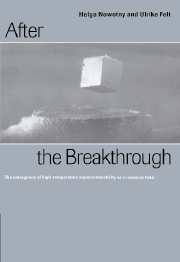Book contents
- Frontmatter
- Contents
- Acknowledgments
- 1 Introduction: the emergence of a new research field
- 2 The context of the discovery
- 3 Reconfiguring actors and knowledge: the organization of a new research field
- 4 Academic research, science policy, and the industrial connection: setting up national high-temperature superconductivity programs
- 5 Science and the media: newspapers and their “HTS story”
- 6 The innovation machinery of science: the case of HTS
- Appendix 1 Main events in the history of superconductivity before the discovery by Müller and Bednorz
- Appendix 2 Chronology of important events in high-temperature superconductivity in the early phase
- References
- Index
4 - Academic research, science policy, and the industrial connection: setting up national high-temperature superconductivity programs
Published online by Cambridge University Press: 02 December 2009
- Frontmatter
- Contents
- Acknowledgments
- 1 Introduction: the emergence of a new research field
- 2 The context of the discovery
- 3 Reconfiguring actors and knowledge: the organization of a new research field
- 4 Academic research, science policy, and the industrial connection: setting up national high-temperature superconductivity programs
- 5 Science and the media: newspapers and their “HTS story”
- 6 The innovation machinery of science: the case of HTS
- Appendix 1 Main events in the history of superconductivity before the discovery by Müller and Bednorz
- Appendix 2 Chronology of important events in high-temperature superconductivity in the early phase
- References
- Index
Summary
Science policy is rarely considered part of the core of the science system, but is seen as peripheral, providing a framework for establishing priorities and allocating research funds, setting up institutional structures within which research programs can proceed with a continuous, predictable level of funding, and providing incentives for the wider transfer of knowledge and for the utilization of research results – usually for the benefit of the national economy. The various models of science policy are closely related to the profiles of national institutions and to the specific instruments of policy-making available to obtain their objectives.
Many observers agree that science policy in the highly industrialized countries has moved through distinct phases or “eras” since the end of World War II. These phases differ in the underlying patterns of scientific and technological change, in the issues on research agendas, in the preferred instruments for decision-making, in the modes of funding, and in the modes of research. It is also said that, in the use and regulation of science as a source of strategic opportunities, science policy is undergoing a process of internationalization, in that international cooperation is being promoted (Ruivo, 1994).
Other science policy analysts diagnose an increasing “denationalization of science”, evidenced by growth of trans-national research cooperation, even in less cost-intensive areas, the shift from public to private funding, and the regionalization of research (Crawford et al.91992). But international cooperation on one level does not necessarily preclude competition on another. The globalization of the economy, the wider geographical distribution of the sources of scientific and technological knowledge, and growing interdependenciesmake it clear that the configurations of cooperation and competition are not fixed, but fluid.
- Type
- Chapter
- Information
- After the BreakthroughThe Emergence of High-Temperature Superconductivity as a Research Field, pp. 72 - 126Publisher: Cambridge University PressPrint publication year: 1997



